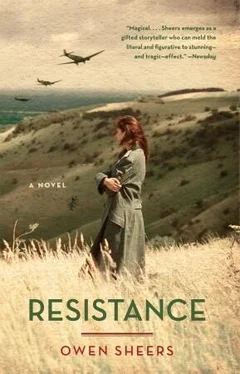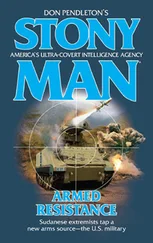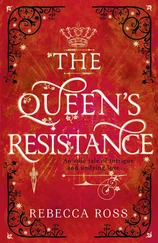The night before the mangel picking, Sarah had spent the evening with Maggie. Over dinner she’d asked to see “The Countryman’s Diary” again. When she did Maggie had looked down into her steaming bowl of soup. “Afraid you can’t, Sarah,” she said simply.
“Why not? We all saw it. I just want a proper read of it, that’s all.”
“I know, bach,” Maggie said, looking up at her. “But I burnt it. After you all left. I put it on the fire.”
Sarah looked back at her, her soupspoon held halfway to her mouth. She placed it in the bowl, feeling a flush of anger pulse through her chest. That pamphlet had been the only thing left; the only sign, the only marker. It was their only connection to their husbands and now Maggie had destroyed it. She felt her anger melt towards tears, tears of frustration, not sadness. The kind of tooth-grinding frustration she’d felt as a child when accused of doing something wrong. A frustration against the flow of events that seemed to always be running counter to her own direction.
“I couldn’t have it around here,” Maggie continued. “What if someone else found it?”
Sarah knew who Maggie was talking about. “I thought you said they wouldn’t come this far. That there was nothing for them here.”
“Well, now there isn’t, is there?” Maggie replied, an edge to her voice. “And honestly, Sarah,” she continued more softly, “you wouldn’t have wanted to see it. There was some horrid stuff in there, really.” She returned to her soup, shaking her head. “Awful,” she muttered between spoonfuls, “awful.”
Sarah walked home through the dark lanes that night still nursing her disbelief, her reluctance to accept the story that appeared to have unfolded before them all. She knew she would still ride out on the hill when she could, though, looking. Just in case. And it didn’t stop her from thinking all the time of where Tom and the other men would go, where, if Maggie’s story was true, they would build their underground shelter. In the meantime, however, the farm demanded her as a suckling baby demands its mother; without malice, without agenda, just simply because it was the way of things. Her farm and the farms of the other women. The whole valley was there, with its cycle of birth, sowing, harvesting, and slaughter, and they, the women, had to keep it turning or it would leave them behind altogether. And that’s why, despite her aching limbs and the gritty tiredness in her eyes, Sarah had woken the next morning and gone to pull mangels with Menna and the others.
When she came back to Upper Blaen that evening, she saw to her own animals, then cooked herself some bacon and potatoes before tying up the dogs for the night. Then, with a slow rain tapping faster at the window, she sat by the fire to write her diary, picking up the thin pen through which she found it so hard to speak faithfully to Tom about how she’d spent her days without him.
4.30 p.m. Wehrmacht Unit, Poss. 4th Infantry Div. (Wehrheis IV) temp. attached to 14th Panzergren. Div.? Travelling N.W. out of Pandy. Dest. Longtown/Michaelchurch?
1 × Mercedes Benz staff car. One driver (1 × sergeant?) three passengers. 1 × officer. Light arms. 2 × MP38 submachine guns .
1 × BMW R35 motorbike and sidecar. Two men. 1 × MG 42 heavy machine gun (7.92mm) on sidecar mount. Light arms .
Shrapnel damage to left wheel arch of staff car .
The tip of the pencil broke through the rice paper as George marked the full stop. He pulled it free, leaving a grey-edged puncture like a tiny bullet hole at the end of the sentence. His hand was shaking. He was too excited. Stay calm, he told himself. Too excited and too tired.
George had been observing troop movements for the past week, but this was the first sign of the enemy probing deeper into the hills, away from the focus points of the railway and the main road. It had all begun as Atkins had predicted, just much slower. The fourteen days had passed and George was still here. Still going about his farmwork by day and running messages at night. But eventually it unfolded exactly as he’d told George it would, as if Atkins himself had planned the invasion.
First there had been their own troops along with scatterings of Americans and Canadians. Mixed regiments, even some Home Guard units, retreating up the railway towards Hereford. There was talk of the smaller towns being handed over to the advancing Germans without putting up a fight, to save the civilians. The newspapers stopped coming and there was less news, more light music, on the radio. Through it all they kept broadcasting light music. George suspected the songs chosen and the order in which they were played were a code, but he couldn’t be sure.
Then, two weeks ago as they’d sat down to breakfast, George’s family heard the guns for the first time. Over the course of the next day they got closer, until George could make out the exact metronomic rhythm of the thud, whine, crash of their firing. From what they could make out, several small units of Allied artillery had stayed behind to slow the German advance. It was among these units the German shells were now landing. George tried to imagine the damage inflicted each time he heard that final crash, but he couldn’t. He hadn’t even seen bombs dropped, let alone artillery fire, and he found it difficult to associate these soft crumples with what he knew must have been terrible explosions.
More messages started appearing at the drop points. It looked as if one of the German invasion armies was moving north and west before curling east again towards London, like a giant wave on the point of breaking. Another was securing the southern approach to the capital and another again was pushing northeast towards the mouth of the Thames. They were closing a pincer around the city, cutting off all escape routes other than those to the north. Bristol fell. The German navy docked warships at Newport.
After the day of the guns, George saw a flurry of civilians moving north, most of them on the main road. Cars crammed with people, luggage, boxes, mattresses tied to their roofs. Horses straining against their yokes, the carts behind them piled high with children, old women, and possessions. The army closed the railway line to civilians. There were protests and a man was shot trying to break through the cordons to the station. Leaflets appeared urging people to stay in their homes, not to try and travel anywhere. George heard of a German parachute agent caught landing outside Hereford. Apparently they were dropping all over the country just in front of the advancing armies, spreading rumours, panic. This one was killed by the crowd before the police could get to him. His accent had been perfect, but then it transpired this was because he wasn’t German at all but English. A Nazi sympathiser who’d moved to Germany before the war.
And then there was silence. No more guns, just the odd drone of bombers flying north. The occasional crackle of antiaircraft fire. All at a distance. Eventually a telephone call came through to the local police station. The news spread throughout the area within hours. A column of German troops was marching into Hereford. Another had already established a Western Headquarters in Abergavenny. After that there were always messages at all the drop points. The wireless operator, who George guessed was most probably Reverend Sheldon at the church, must have been active nonstop for forty-eight hours.
For the first three days after that telephone call, George saw nothing. But then he found an excuse to go down to the railway station during the day. Constable Evans, looking pale and strained, had visited his father and confirmed the area was now under German occupation. He also said that, for now, essential movement of livestock was still being allowed. George’s father was expecting a batch of chicks on the Hereford train and it was there, at the two-track station in Pandy he’d known all his life, that George saw his first German soldiers.
Читать дальше












